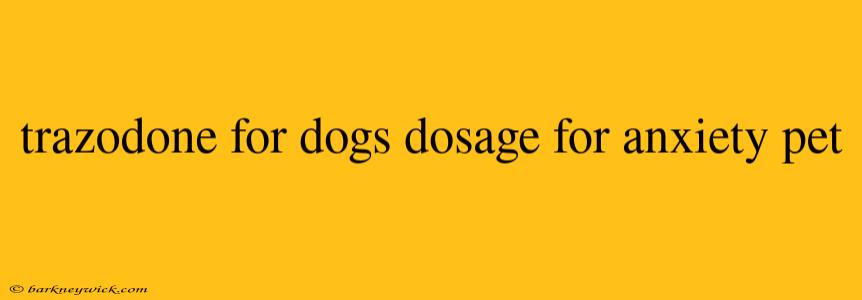Trazodone for Dogs: A Safe and Effective Anxiety Relief?
My dog, Luna, is a rescue and has always struggled with separation anxiety. The thought of leaving her alone was enough to send my heart racing. I'd tried everything - calming chews, music, even a special "safe space" - but nothing seemed to work. That's when my vet mentioned Trazodone, a medication often used to treat anxiety in both humans and dogs.
It was a game-changer. Luna's anxiety significantly decreased, and she was able to relax even when I was gone. But the process wasn't without its challenges. Figuring out the right dosage and understanding the potential side effects took time and careful monitoring.
Trazodone for Canine Anxiety: Understanding the Facts
Trazodone is a serotonin antagonist and reuptake inhibitor (SARI) that works by increasing serotonin levels in the brain. This helps to regulate mood and reduce anxiety.
In my opinion, Trazodone is a valuable tool for managing anxiety in dogs. It can help reduce excessive barking, destructive behavior, and fearfulness.
However, it's crucial to remember that Trazodone is a prescription medication, and it should only be administered under the guidance of a veterinarian.
Determining the Right Trazodone Dosage for Your Dog
The correct dosage of Trazodone for dogs will vary depending on several factors, including:
- Dog's weight and breed: Smaller dogs typically require lower doses than larger breeds.
- Severity of anxiety: Dogs with more severe anxiety may need a higher dose.
- Individual response to medication: Some dogs may respond well to a lower dose, while others may require a higher dose.
It is imperative to follow your veterinarian's instructions precisely regarding dosage and administration.
Common Side Effects of Trazodone in Dogs
Trazodone is generally well-tolerated by dogs, but potential side effects can include:
- Drowsiness: This is the most common side effect, and it usually subsides after a few days.
- Sedation: In some cases, Trazodone can cause excessive sleepiness.
- Gastrointestinal upset: Some dogs may experience vomiting, diarrhea, or loss of appetite.
- Changes in behavior: Trazodone can sometimes cause increased agitation or aggression, but this is rare.
It's important to monitor your dog closely for any adverse reactions and contact your veterinarian immediately if you notice any concerns.
Finding Alternatives to Trazodone
While Trazodone is a popular choice for anxiety relief, alternative treatments exist.
- Behavioral Modification: Working with a certified professional dog trainer can help address the root cause of your dog's anxiety and teach them coping mechanisms.
- Natural Remedies: Some natural remedies like calming chews or essential oils may offer temporary relief, but they are not a substitute for veterinary care.
Remember to consult with your vet to determine the best course of action for your dog's individual needs.
When to Consider Trazodone for Your Dog
If your dog exhibits the following symptoms, consider discussing Trazodone with your veterinarian:
- Excessive barking, howling, or whining
- Destructive behavior (e.g., chewing, digging)
- Fear of specific situations or objects
- Trembling or shaking
- Restlessness and pacing
- Hiding or avoiding people
The American Veterinary Medical Association is a reliable source for general information on pet health.
Conclusion
Trazodone can be a valuable tool for managing anxiety in dogs. However, it's important to understand the potential side effects and to administer it under the guidance of a veterinarian. By carefully monitoring your dog and working closely with your vet, you can help your furry friend overcome anxiety and enjoy a happier, calmer life.
